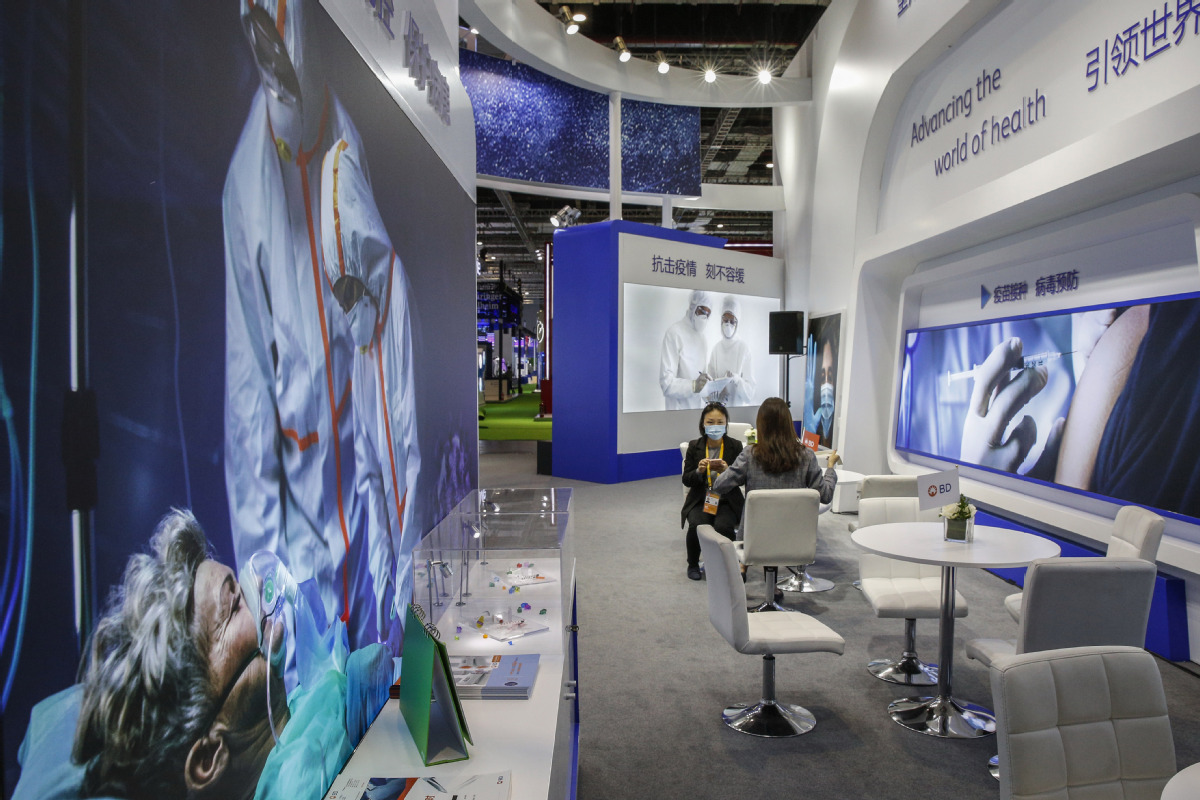Anti-COVID products, technologies stand out at Shanghai event


Medical industry exhibitors at the third China International Import Expo in Shanghai are showcasing the latest products that highlight innovation and collaboration as key to the world's COVID-19 combat.
Industry observers said this is significant as some countries are experiencing the second wave of the pandemic, and could benefit from products that are on display at the CIIE.
Some 48 companies are exhibiting their blockbuster products and technologies related to the prevention and treatment of the novel coronavirus pneumonia.
Their products stand out in the public health and epidemic prevention exhibition zone that has been added to the expo this year.
The products and technologies reveal tireless efforts of the medical industry to contain the spread of the novel coronavirus and facilitate an optimized defense system against it.
Protective suits and disinfectants for prevention, test kits and CT devices for testing, and ventilators and extracorporeal membrane oxygenation machines for treatment are on display at the 12,000-square-meter zone.
The initial planned area for this section of the expo was 2,000 square meters but was expanded multiple times, following a high level of enthusiasm among exhibitors, according to the CIIE organizer.
Tocilizumab, a star immunosuppressant from Roche Pharma, which has been found to reduce the need for mechanical ventilation among acute COVID-19 patients, is among the exhibits. In early March, the National Health Commission included Tocilizumab in the country's COVID-19 diagnosis and treatment plan.
Roche said research results showed COVID-19 patients who received the drug plus standard treatment were 44 percent less likely to progress to mechanical ventilation or death compared with other patients receiving placebo plus standard treatment.
Roche donated the drug worth around 14 million yuan ($2.1 million) to support medical institutions across China, particularly in Wuhan, Hubei province, when the city was hit hard by the epidemic.
Takeda, a Japanese biopharmaceutical company, said it has joined hands with world-leading plasma companies to set up the COVID-19 Plasma Alliance to help develop a potential plasma-derived therapy for acute cases.
Takeda said an experimental therapy is now being tested in a phase-III clinical trial. If successful, the alliance's hyperimmune intravenous immunoglobulin may become one of the earliest treatment solutions for hospitalized, adult COVID-19 patients.
In parallel research, Takeda is also testing four products that could be effective against COVID-19.
"COVID-19 reminds us that public health matters for global prosperity, and cross-border collaboration is essential to fight against the pandemic," said Sean Shan, president of Takeda China. "In such a context, the (third) CIIE offers a new ecosystem to bolster global cooperation in innovation."
AbbVie, a debutant at the CIIE, is exhibiting a potential antibody therapy that is being jointly researched and developed with a US-based pharmaceutical company, Harbour BioMed, a Chinese biotech company, and two universities in the Netherlands-Utrecht University in Utrecht and Ernakulam Medical Centre in Rotterdam. The antibody therapy, if proven successful, would prevent as well as treat COVID-19.
Fosun Health is exhibiting an experimental COVID-19 vaccine it jointly developed with Germany's BioNTech, a biotech company specializing in messenger RNA, or mRNA. In July, the mRNA vaccine candidate was approved in China for stage-I clinical trial, which will be kicked off in Taizhou city, Jiangsu province.
"By Sept 4, all 144 participants in the trial had completed taking the vaccine twice and were responding well," Fosun Health said in a news release.
Another vaccine candidate jointly developed by BioNTech and Pfizer has started stage-II B and stage-III multicenter clinical trials in countries including the United States since July. On Sept 12, Pfizer said it will expand the number of participants in its large-scale trials from 30,000 to 44,000.
Compared with traditional vaccines, mRNA candidates are said to be more efficient in research and development, offer better safety, and their production can be swiftly scaled up.
Experts said they believed such vaccines are suitable during sudden outbreaks of epidemics like COVID-19.
- Star products set to dazzle third CIIE
- IMF: China can help support 'major challenges' in global recovery
- Chinese market a world market, a shared market, a market for all: China Daily editorial
- Watch it again: President Xi gives address at opening ceremony of 3rd CIIE
- China fully implements opening-up measures announced at last year's CIIE




































